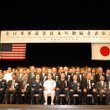U.S., Afghan soldiers trade volleys — ‘No problem!’

View Gallery (4 images)
FORWARD OPERATING BASE PASAB, Afghanistan — “Dude! Look at that. That’s totally cheating!”
“What even is that?”
“It’s a carry, man.”
“No, that’s way past a carry. That’s a catch-and-throw.”
Whatever it is, the Afghan soldiers are too happy to care. They catch the volleyball, pause, then toss it into the air, nearly always to the same man, the violent hitter in the orange shirt, who spikes it over the net.
The American soldiers have not yet figured out how to defend against him or the catch-and-throw technique. For now, they’re laughing, and losing.
It’s volleyball night in the motor pool. The headquarters company of the 2nd Battalion, 87th Infantry Regiment versus the headquarters company of the 3rd Kandak, 3rd Brigade of the Afghan National Army’s 205th Corps. Dust and diesel fumes, shouting in at least a couple of languages. Men who would not normally be doing this together.
But the units are paired, the Americans mentoring the Afghans in one of the war’s most violent regions along the Arghandab River in southwestern Kandahar. Breaks like this bring them closer, American officers say.
And the Afghans love volleyball.
I’m always amazed by this, their infatuation with this game. It seems, at first, counter to Islam, somehow too Western. Yet, even in remote villages I have seen volleyball courts scraped into the earth, the posts like exclamation points. On American bases, in large gyms, I have seen teams of Afghan workers thrash teams of soldiers and contractors. And I have heard Afghan elders — serious men with long beards and lined faces — ask young Americans if they could please bring a volleyball next time they visit.
So maybe it shouldn’t surprise me to see the Afghans serving and spiking and clapping politely after a fine play.
“Good! Good! No problem!” An Afghan soldier says in English, tossing the ball back to the American side and holding up both thumbs.
Dusk, the orange light sinking away. Above floats the lighter-than-air dirigible that watches over everything. The eye in the sky. Tonight it is like the Goodyear blimp cruising over a stadium game, sort of.
On the sidelines, Sgt. 1st Class Cameron Shoemaker stands in a cloud of sweet, heavy smoke, grilling steaks and ribs for the players. On a table, boxes of potato salad and baked beans. Drinks in the big gray trash can full of ice. Shoemaker tells me the 2-87, part of the 10th Mountain Division from Fort Drum in New York, tries to barbecue with its Afghan comrades twice a month, but the volleyball is new. He does all the grilling.
“It’s my hobby. When I retire, I’m gonna open up a restaurant.”
The Afghans love barbecue, too. They’ll pile their plates high and drink cans of nonalcoholic Beck’s beer. The game and the food are strings that pull the two groups of soldiers together. Neither requires much language. Neither pushes too much at cultural boundaries. And in this easy way, the Americans say, the soldiers learn to trust each other.
“This is one of the few things we can do to really hang out with them,” says 1st Lt. Jubail Akut, who has fought alongside the Afghans in this region. “The ANA, if they don’t like you, they won’t support you in a firefight.”
On the court, the Americans are coming back. They’re down two games, but now, in the spirit of cross-cultural exchange, they’re borrowing Afghan technique: Capt. Timothy Hodge is applying the catch-and-throw method. The team has also moved two huge soldiers — well over 6 feet — up into blocking positions at the net.
On the Afghan side, the unit commander, a large, barrel-bellied captain, steps in to play wearing a white shalwar kameez. Another Afghan with a dark beard, also wearing the long traditional shirt and baggy pants, steps up to serve.
Thunk.
The ball sails over. A soldier swats it up to Hodge. Hodge catches it, pauses. He tosses it up, setting it for one of the tall soldiers, already airborne. Spike, slam, point. The Americans begin winning.
A little after 6 and the light has mostly vanished, the sun blocked out by a row of battered shipping containers. In the motor pool, other soldiers are starting up their trucks, preparing for a re-supply run.
The Afghans must go. They shake hands and smile and drift off to evening prayers. The Americans fill up on steak and beans and potato salad.
“Every little thing that you do outside the combat operations with them is important,” Akut says.
I ask about their combat skills and he grins. I ask about their volleyball skills and his smile disappears.
“They are excellent,” he says, seriously. “Even the most unfit-looking guy can spike a volleyball.”










